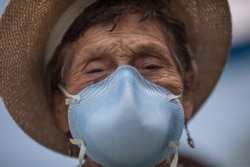With cases reaching double digits in just a week, the coronavirus has hit home in the U.S. capital and surrounding areas.
Just three miles from Washington, Arlington County, Virginia, also has confirmed cases of the disease. Big medical bills for testing and treating coronavirus are a source of concern for the 11,000 low-income and uninsured adults in the county of more than 200,000 residents.
"They will be hit harder by the virus. If people aren’t able to go to restaurants, if all of a sudden the schools closed and they can’t go to work because their children are at home, they don’t have a financial cushion, so they could easily be affected financially by it,” Nancy White, president of the Arlington Free Clinic, told VOA.
Off-site Testing
Arlington Free Clinic has been serving an average of 1,600 patients per year since 1994. Now, amid the coronavirus outbreak, it is working with county health officials to set up an off-site coronavirus testing center.
Such a center would give the clinic "the ability to do testing away from the hospital with a primary focus on people who are hard to reach, hard to serve, and are low income and may be afraid to access the health system," White said, noting that details were still under discussion.
White said she expected hospitals to waive medical bills for those who needed treatment, or to charge on a sliding scale for those who were eligible for reduction in cost.
Out of the $8.3 billion federal emergency fund approved by Congress and the president to combat the coronavirus, about $1 billion will go to state and local public health efforts around the United States, including community health centers catering to uninsured and underinsured people.
Care for homeless
The nonprofit group N Street Village, supporting Washington’s homeless women, is working with the District of Columbia Health Department and the Emergency Management Office to set up ways to provide aid in response to the coronavirus pandemic. Officials said the key was to screen for symptoms, identify infected patients and isolate them to avoid spreading the disease.
"If they were showing symptoms, we would refer them to see the doctors or nurses directly on site. And that person could then make a recommendation about whether they thought they needed to go somewhere,” said Schroeder Stribling, CEO of N Street Village.
She said homeless people are particularly vulnerable to infections. They do not have a place to go to self-quarantine and often have underlying health conditions, such as chronic lung disease.
Stribling added that the lack of health insurance would not keep people from seeing doctors, as many homeless people have Medicare or Medicaid, the U.S. government's health care programs for older and low-income people, respectively.
N Street Village is also providing coronavirus information to residents through handouts and flyers and a series of meetings.
Global health security
Working to provide a stronger safety net for the vulnerable is an urgent task not only in the U.S. but also around the world, where at least 123 countries have seen coronavirus cases.
The Global Health Security Index, a study released last October by Johns Hopkins Center for Health Security and other organizations, has found severe weaknesses in each country’s preparedness for epidemics. Countries with weak health care systems were cited as a particular concern.
"There are certainly countries in sub-Saharan Africa, some countries in Asia, some countries in South America. One thing about our index, which is important, is that the U.S. did score better — and the U.S. has been spending a lot of money on preparedness programs — but even the U.S. did not get a perfect score,” said Tom Inglesby, director of the Johns Hopkins Center for Health Security.
Inglesby said countries with weak systems might lack personal protective equipment, capacity to care for critically ill patients, and the ability to ramp up testing.
Dr. Jonathan Quick, adjunct professor of global health at the Duke Global Health Institute, said a number of low-income countries do not have universal health insurance coverage, whereas Western European countries like Germany and Britain have a very high level of insurance coverage.
His colleague, Dr. Wenhui Mao, expressed concern about the spread of coronavirus, particularly in Africa.
"In African countries, maybe it takes one hour to visit the clinics," she said. "We need to pay attention to them. If they can’t come, then maybe we should take outreach methods to provide treatment for them.”








